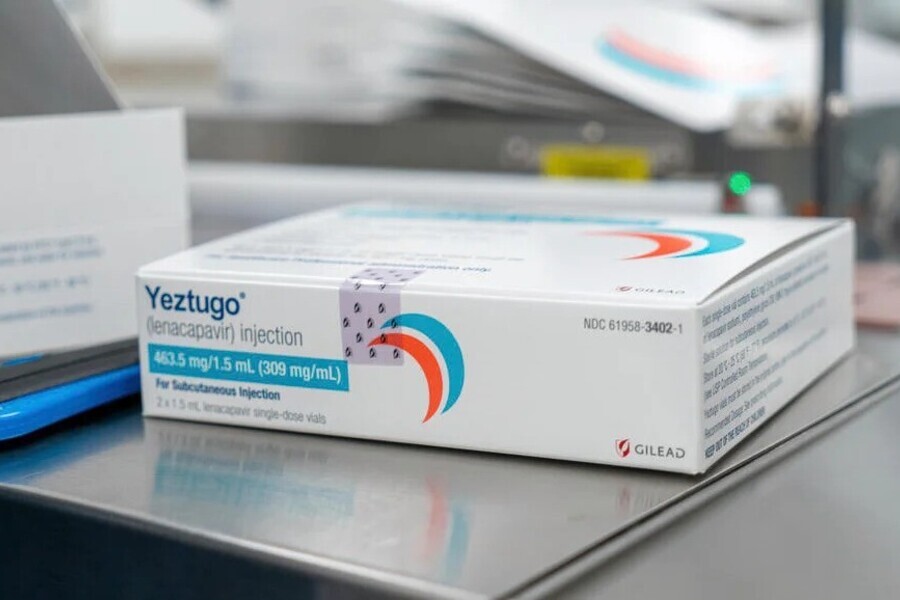In a landmark development in the decades-long battle against HIV, the U.S. Food and Drug Administration (FDA) has approved lenacapavir, a twice-yearly injectable drug designed to prevent HIV infection. The long-acting treatment, now branded as Yeztugo by pharmaceutical company Gilead Sciences, represents a significant breakthrough in HIV prevention strategies and could revolutionize efforts to curb the virus.
A Game-Changer in HIV Prevention
The FDA’s decision, announced Wednesday, is based on robust clinical trial data showing that 99.9% of participants who received lenacapavir remained HIV-negative. This unprecedented level of efficacy positions Yeztugo as a powerful new tool in the national and global effort to eliminate HIV transmission.
Daniel O’Day, Chairman and CEO of Gilead Sciences, hailed the approval as a turning point:
“Yeztugo will help us prevent HIV on a scale never seen before,” O’Day said. “We now have a way to end the HIV epidemic once and for all.”
The Centers for Disease Control and Prevention (CDC) estimates there were 31,800 new HIV infections in the United States in 2022, underscoring the persistent need for innovative approaches to prevention, especially among vulnerable and underserved populations.
How Yeztugo Works
Unlike daily oral pre-exposure prophylaxis (PrEP) drugs such as Truvada and Descovy, Yeztugo requires only two injections per year. This long-acting solution is especially beneficial for individuals who struggle with daily adherence due to stigma, access issues, or personal preferences.
Lenacapavir is a capsid inhibitor, a new class of antiretrovirals that interferes with the HIV capsid, a protein shell essential to viral replication. By blocking this mechanism, lenacapavir effectively prevents the virus from establishing an infection.
Broader Implications and Controversy Over Vaccine Funding Cuts
While the approval of Yeztugo is being celebrated in the medical and public health communities, it arrives amid growing concern over the Trump administration’s decision to halt federal funding for HIV vaccine research. Officials have argued that current preventive tools—including PrEP and injectable options like lenacapavir—are sufficient to combat HIV. However, many researchers strongly disagree.
Dr. Barton Ford Haynes, director of the Duke Human Vaccine Institute, called lenacapavir a “wonderful development for the field” but stressed that it should not replace efforts to develop a vaccine.
Immunologist Dennis Burton of Scripps Research echoed that sentiment, warning that recent progress in vaccine research could be lost:
“For HIV vaccine design and development, we’ve begun to see light at the end of the tunnel after many years of research. This is a terrible time to cut it off,” Burton said. “We’re beginning to get close. We’re getting good results out of clinical trials.”
Burton also cautioned that once disrupted, HIV vaccine research cannot easily be restarted.
“This is a decision with consequences that will linger. This is a setback of probably a decade for HIV vaccine research,” he added.
What This Means for the Fight Against HIV
The approval of Yeztugo marks a crucial advancement in public health tools available to fight HIV, particularly in reducing transmission in high-risk populations. It also reinforces the U.S. government’s broader commitment to ending the epidemic, even as debate continues over the most effective long-term strategy.
However, the discontinuation of vaccine research funding has added complexity to that mission, raising concerns among scientists that the opportunity for a true HIV cure—or universal vaccine—may be delayed for years, if not lost.
What’s Next?
With FDA approval now secured, Gilead is expected to begin rolling out Yeztugo to clinics and healthcare providers nationwide, pending insurance and access negotiations. The company is also working with community organizations to ensure equitable distribution, especially among populations disproportionately affected by HIV, including Black and Latino communities and men who have sex with men.
Public health experts are now calling on policymakers to reassess recent funding decisions and ensure that breakthroughs like Yeztugo are part of a multi-pronged strategy—including continued research into vaccines and cures—to truly bring an end to the HIV epidemic.
User Intent Answer
Yes, the FDA has approved lenacapavir (Yeztugo), a twice-yearly injection to prevent HIV, with 99.9% efficacy shown in clinical trials. This breakthrough could transform prevention strategies, but researchers warn it should not replace continued vaccine development, which has suffered a major setback due to recent federal funding cuts.
